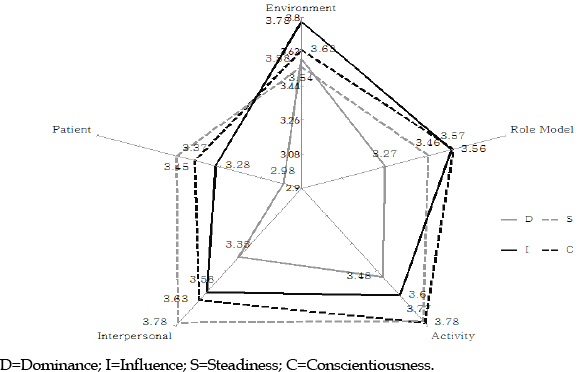Perspect Nurs Sci.
2017 Oct;14(2):81-89. 10.16952/pns.2017.14.2.81.
Levels of Clinical Practice Stress and Coping Strategies according to Nursing Students' Personality/Behavior Types
- Affiliations
-
- 1Undergraduate Student, College of Nursing, Seoul National University, Seoul, Korea.
- 2Professor, College of Nursing · Research Institute of Nursing Science, Seoul National University, Seoul, Korea. kim0424@snu.ac.kr
- KMID: 2394903
- DOI: http://doi.org/10.16952/pns.2017.14.2.81
Abstract
- PURPOSE
This study was performed to identify levels of clinical practice stress and coping strategies according to the personality/behavior types of nursing students.
METHODS
The subjects of this study were 143 third- and fourth-grade nursing students in 14 nursing colleges who had experienced clinical practice. The questionnaire consisted of instruments to identify Dominance, Influence, Steadiness, and Conscientiousness (DISC) personality/behavior types, clinical stress, and stress coping strategies. The data were analyzed using Cronbach's α, descriptive statistics, and ANOVA, using the SPSS 24.0 program.
RESULTS
The DISC pattern showed high priority in Steadiness (48.3%), followed by Conscientiousness (21.0%), Influence (16.1%), and Dominance (14.7%), in that order. The steadiness type showed the lowest level of stress among four patterns.
CONCLUSION
This study found that the personality/behavior types of nursing students differ. Additionally, different personality/behavior types can be attributed to stress levels and stress coping behaviors. Based on these results, different personality and behavior types of nursing students should be considered to manage their stress levels related to the clinical practicum experience.
MeSH Terms
Figure
Reference
-
1. Yee JA. A study on the image of nurses and the professional self-concept perceived by nursing students. J Korean Acad Nurs Adm. 2004; 10(3):325–334.2. Park HJ, Jang IS. Stress, depression, coping styles and satisfaction of clinical practice in nursing students. J Korean Acad Soc Nurs Educ. 2010; 16(1):14–23. DOI: 10.5977/JKASNE.2010.16.1.014.
Article3. Bell ML. Learning a complex nursing skill: student anxiety and the effect of preclinical skill evaluation. J Nurs Educ. 1991; 30(5):222–226.
Article4. Lee YR, Kim SH, Chu MS. Stress, stress coping, and school adaptation according to Myers-Briggs Type Indicator (MBTI) personality type in freshmen nursing students. J Korean Acad Soc Nurs Educ. 2013; 19(2):172–182. DOI: 10.5977/jkasne.2013.19.2.172.
Article5. Jung M. Effect of MBTI growth program on the state anxiety of nursing students before initial clinical experience. J Korean Acad Psych Ment Health Nurs. 1997; 6(1):70–81.6. Lazarus RS, Folkman S. A stress, appraisal and coping. New York: Springer;1984.7. Park CS. An analysis of the difference of the technical high school students' stress coping behavior in MBTI personality type [dissertation]. Seoul: Konkuk University;2001.8. Eysenck HJ. Stress disease and personality: the inoculation effect. In : Cooper CL, editor. Stress research. New York: John Wiley & Sons;1983. p. 121–146.9. Han AK, Kim OS, Won JS. A study on job stress and coping method by the personality types of clinical nurses. J Korean Clin Nurs Res. 2007; 13(2):125–136.10. Nam SH. A study on stress in practice and coping style according to the personality types of nursing students [dissertation]. Daegu: Kyungpook National University;2008.11. Marston WM. Emotions of normal people. Minnesota: Persona Press;1979.12. Lee YH. Beauty services satisfaction and revisit purpose following customer's personality types-in center of DISC behavior type- [dissertation]. Seoul: SeoKyung University;2012.13. Whang SJ. The relationship between clinical stress, self-efficacy, and self-esteem of nursing college students. J Korean Acad Soc Nurs Educ. 2006; 12(2):205–213.14. Beck DL, Srivastava R. Perceived level and sources of stress in baccalaureate nursing students. J Nurs Educ. 1991; 30(3):127–133.
Article15. Kim SL, Lee JE. Relationship among stress coping strategies, and self-esteem in nursing students taking clinical experience. J Korean Acad Soc Nurs Educ. 2005; 11(1):98–106.16. Kim SM, Hwang TY. Comparison of stress levels arising in clinical settings, stress coping mechanisms and clinical competency between male and female nursing students. J Korean Acad Soc Nurs Educ. 2014; 20(4):606–616. DOI: 10.5977/jkasne.2014.20.4.606.
Article17. Roncaglia I. Retirement transition in ballet dancers: “coping within and coping without”. Forum Qual Sozialforschung/ Forum Qual Soc Res [Internet]. 2010. 05. cited 2017 May 20. 11(2):Available from: http://nbn-resolving.de/urn:nbn:de:0114-fqs100210. DOI: 10.17169/fqs-11.2.1348.18. Lee HJ. The study of verification of stress-coping-adaptation model for unwed mother and comparative study on each groups classified by the decision on the future of their baby; based on Lazarus and Folkman's stress-coping-adaptation model [dissertation]. Seoul: Sungkyunkwan University;2012.19. Folkman S, Lazrus RS. If it changes it must be a process: a study of emotion and coping during three stages of collage examination. J Pers Soc Psychol. 1985; 48(1):150–170.
Article20. Kim B. Communication competence and satisfaction in interpersonal relationship based on DISC behavior patterns [dissertation]. Seoul: Kyung Hee Univereity;2008.21. Park HJ, Oh JW. The relationships of the clinical practice stress and the major satisfaction with the nursing professionalism of nursing college students. J Digit Converg. 2014; 12(12):417–426. DOI: 10.14400/JDC.2014.12.12.417.
Article22. Park YM, Ju HJ. Personality types of nurses and the relation between self-efficacy and clinical performance ability. J Digit Converg. 2016; 14(11):333–345. DOI: 10.14400/JDC.2016.14.11.333.
Article23. Kang HY, Choi EY. Stress, stress coping methods, and college adjustment according to behavioral styles in freshman nursing students. J Korean Acad Soc Nurs Educ. 2015; 21(3):289–297. DOI: 10.5977/jkasne.2015.21.3.289.
Article24. Cha SM. Study on the differences in the stress and the strategies for coping with such stress arising from clinical fieldwork in accordance with the DISC behavioral style of some of the students of occupational therapy department. J Digit Converg. 2016; 14(8):469–478. DOI: 10.14400/JDC.2016.14.8.469.
Article
- Full Text Links
- Actions
-
Cited
- CITED
-
- Close
- Share
- Similar articles
-
- Differences in Stress and Stress Coping Strategies according to Emotional Intelligence in Nursing Students
- Comparison of Stress Levels Arising in Clinical Settings, Stress Coping Mechanisms and Clinical Competency between Male and Female Nursing Students
- Stress, Stress Coping Methods, and College Adjustment according to Behavioral Styles in Freshman Nursing Students
- Relationship among Stress of Clinical Practice, Stress Coping, Ego-Resilience and Clinical Competence in Nursing Students
- The effect of verbal violence, clinical practice stress, and coping with stress on nursing students’ major satisfaction during clinical practice


